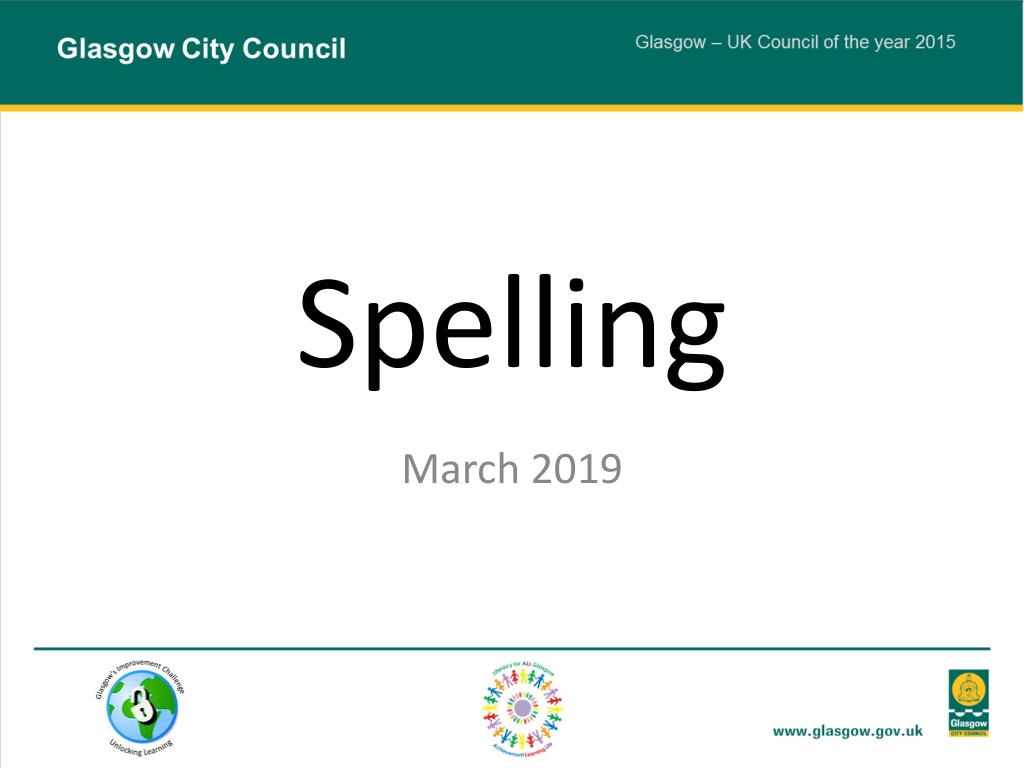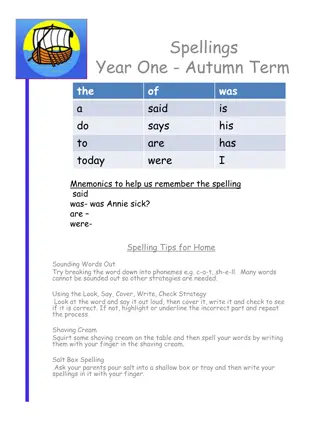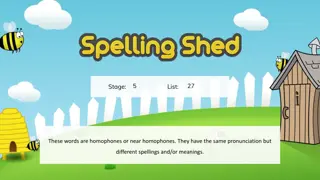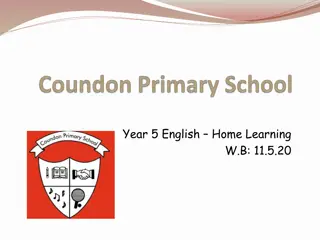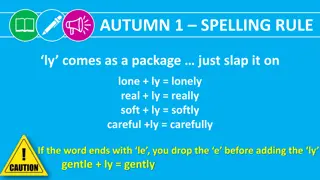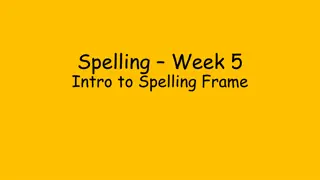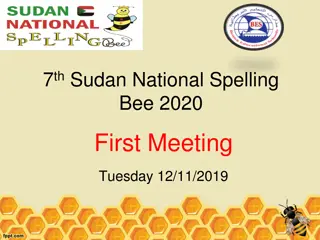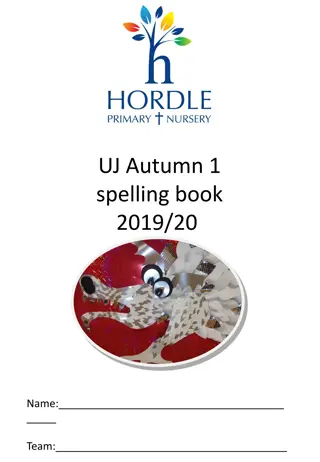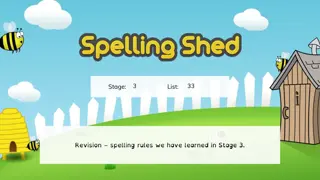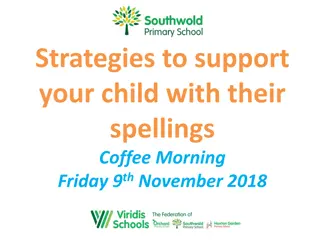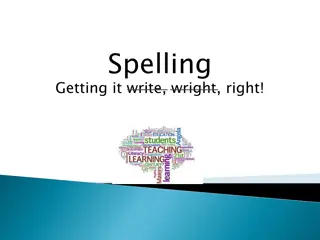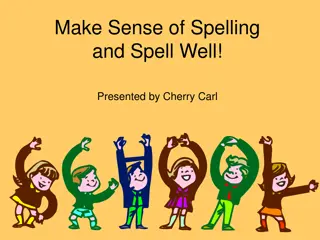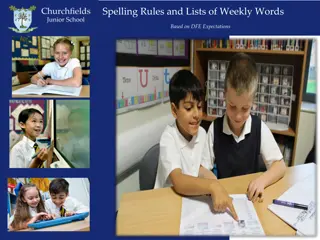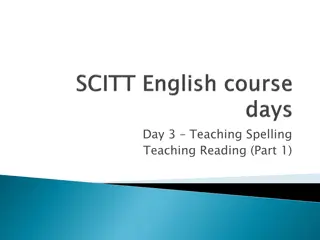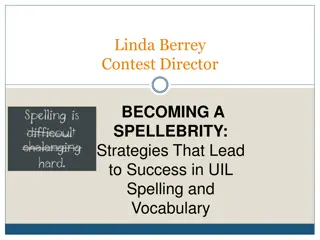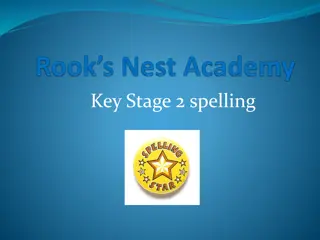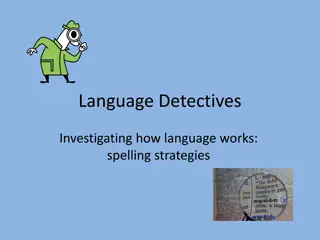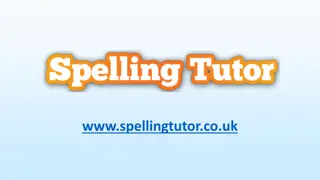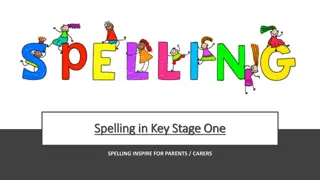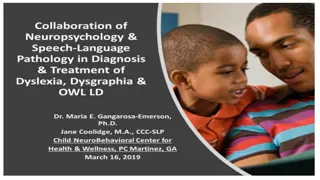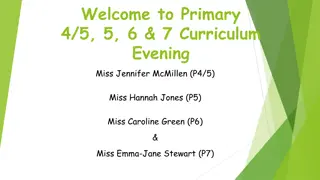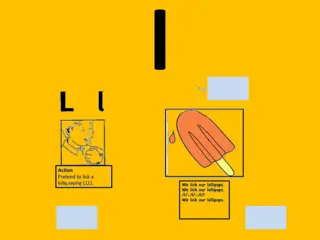Improving Spelling Skills for Better Learning
Enhancing spelling skills is crucial for academic success. The program highlights the evolution of spelling education, emphasizing the progression from limited reinforcement to daily, multi-sensory teaching methods. Structured stages, such as Stage 1 focusing on initial sounds and phonemes, facilitate the gradual development of spelling proficiency through engaging activities and phonics reinforcement. The approach also incorporates peer and self-assessment for holistic learning, ensuring that spelling knowledge is applied effectively across various subjects.
Download Presentation

Please find below an Image/Link to download the presentation.
The content on the website is provided AS IS for your information and personal use only. It may not be sold, licensed, or shared on other websites without obtaining consent from the author.If you encounter any issues during the download, it is possible that the publisher has removed the file from their server.
You are allowed to download the files provided on this website for personal or commercial use, subject to the condition that they are used lawfully. All files are the property of their respective owners.
The content on the website is provided AS IS for your information and personal use only. It may not be sold, licensed, or shared on other websites without obtaining consent from the author.
E N D
Presentation Transcript
Spelling March 2019
Spelling Previously Not given enough priority in a busy week Spelling list introduced at beginning of a week Homework driven Words not particularly reinforced during the week Weekly spelling test
Spelling Now North Lanarkshire programme introduced in session 16 17 Now in our 3rdyear North Lanarkshire programme now recommended city wide We continue to up skill new staff through coaching and drop in sessions Features structure and progression
Spelling Improvements Spelling is specifically taught every day Multi sensory and active Peer work/assessment Self assessment Apply spelling knowledge across the curriculum
Spelling Stage 1 Initial sounds/phonemes - two a week Action game - passing a box of objects Teacher models how to write letter Pupils form letter in the air, on their hand, on the floor
Spelling Stage 1 Teaching Order To allow for early word building, these phonemes are taught first: s a t p i n Phonemes are the smallest units of sound in a word e.g. pin p/i/n or chip ch/i/p
Spelling Stage 1 Jolly Phonics stories and songs reinforce the sounds Magnetic letters used in pairs to make words throughout week Carousel of active spelling activities Focus groups to reinforce the sounds, teach formation and write words containing phoneme
Spelling Stage 1 The use of elkonin boxes is modelled and pupils write words in these, remembering that one box is for one sound.
Spelling Stage 1 Common words are taught each week the and my got into you old out with now much your
Spelling Stage 1 Progress to digraphs: one a week (two letters that together make one sound e.g. sh, ch, th) Term 4 Word Reader and Word Maker introduced links to spelling stages 2 & 3
Spelling Stage 2 & 3 Day 1 Letters used to make the new phoneme of the week Listen to phoneme story and identify words with selected phoneme Form phoneme letters in the air, on their hand, on the floor then write on their board Model how to spell words using magnetic letters
Spelling Stage 2 & 3 Day 1 Pupils spell words with own magnetic letters Pupils read and cover up their words before writing them independently Pupils use the familiar strategy: Say Make/Break Blend Read Cover Write Check
Spelling Stage 2 & 3 Day 2 Word Reader and Word Maker pairs Using magnetic letters and independent writing
Spelling Stage 2 & 3 Day 3 Models sentences using two or three of the phoneme words Pupils write one or two sentences Targets include capital letters, full stops, joining words, neat handwriting Share sentences with another pair
Spelling Stage 2 & 3 Day 4 Models how to sound out and write words on elkonin boxes Word Reader and Word Maker using elkonin boxes Teacher/partner dictation
Spelling Stage 2 Some Common/Tricky Words are come said could after their only by of her new before
Spelling Stage 3 Some Common/Tricky Words three these too school which what bring long again some people never
Spelling Stage 4 & 5 Similar structure as stages 1-3 Partner working continues Four week programme introduced
Spelling Stage 4 & 5 Two weeks focus on teaching the different representations of a phoneme sound e.g. ee can be made by: ee, e, ea, ie, e-e. Ten day programme includes independent and partner tasks to consolidate phonological awareness
Spelling Stage 4 & 5 Week 1 Monday L.I. Know that a sound can be spelt in different ways S.C. List different ways of spelling the sound ee
Spelling Stage 4 & 5 Week 1 Tuesday L.I. Know different ways to spell the sound ee S.C. Make lists of words in spelling patterns for each phoneme
Spelling Stage 4 & 5 Week 1 Tuesday ee e ea ie e-e see free sleep be he behind sea team peace thief field mischief these here complete
Spelling Stage 4 & 5 Week 1 Wednesday & Thursday L.I. Investigate how to break words into phonemes S.C. Break words into the smallest units of sound (elkonin boxes) Check accuracy
Spelling Stage 4 & 5 Week 1 Friday L.I. Spell words containing target phonemes with accuracy S.C. Write the words, circle the phoneme and partner check
Spelling Stage 4 & 5 Week 2 Monday L.I. Investigate how letters and sounds come together to form words S.C. Use diacritical marking code Record the number of sounds in a word
Diacritical Marking Code Single sounds/phonemes are marked with dot under the sound _Joined phonemes are marked by underlining with a dark line Split phonemes are marked with a joining loop
Diacritical Marking Code shape
Spelling Stage 4 & 5 Week 2 Tuesday & Wednesday L.I. Investigate how letters and sounds come together to form words S.C. Use diacritical marking code Record the number of sounds in a word (working in pairs)
Spelling Stage 4 & 5 Week 2 Thursday L.I. Correctly spell words with the ee phoneme from the phoneme story S.C. Listen to story Use knowledge of phoneme to spell accurately Check with a partner
Spelling Stage 4 & 5 Week 2 Friday L.I. Use knowledge of phonemes to spell accurately S.C. Choose a strategy Spell accurately
Spelling Stage 4 & 5 Week 3 Monday & Tuesday L.I. Use a variety of spelling strategies to spell common/tricky words S.C. Explain strategies used to spell the words
Spelling Stage 4 & 5 Some Common/Tricky Words beautiful important decided listen million accident emotion frightened counting different satisfied bought
Spelling Stage 4 & 5 Spelling Strategy 4 Compound Words break + fast = breakfast straw + berry = strawberry + =
Spelling Stage 4 & 5 Spelling Strategy 5 Using Analogy Knowing how to spell some words helps spell others light: bright, flight fight, night, sight
Spelling Stage 4 & 5 Some other spelling strategies include: Phonic Knowledge (ch/ai/n) Syllabification (hol i day) Words within Words (country count/try) Mnemonic (because) Spelling Rules (no words in English end in v , they use ve gave, have, above)
Spelling Stage 4 & 5 Week 3 Wed, Thurs & Fri L.I. Spell common/tricky words accurately S.C. Use spelling strategies to spell common words accurately
Spelling Stage 4 & 5 Week 4 Monday L.I. Know common spelling rules S.C. List words for the spelling rule
Rule One:q L.I. The letter q is always followed by the letter u. Together they make the kw sound. quiz, acquaintance, quiet, quite, aqua, earthquake, quaint, equation, consequence, equilateral, quadrilateral, acquire
Spelling Stage 4 & 5 Week 4 Tuesday L.I. Use the spelling rule S.C. Spell accurately Partner check spelling and help if required
Spelling Stage 4 & 5 Week 4 Wednesday & Thursday L.I. Practise targeted spelling strategies S.C. Use active spelling strategies to consolidate spelling.
Spelling Stage 4 & 5 Week 4 Friday L.I. Peer and self assessment of spelling S.C. Identify successes and next steps in spelling
Spelling Stage 4 & 5 Spelling Activities Rainbow writing Backwards, capital, dot writing Hangman Magazine cuts Highlighting Spelling tennis Lots more!
Spelling Stage 6 & 7 Part 1 Continue to build on previous learning Spelling strategies and spelling rules continue to be the focus Children work with partners to problem solve how they can spell Common words appropriate to stage, interdisciplinary learning, writing genre features or current school events
Spelling Stage 6 & 7 Part 2 Investigating root words and affixes Understanding how these affect the meaning of a word Root word: consider Prefix: re (again) reconsider Suffix: ate (state of) considerate (showing thought) Homophones e.g. ate and eight. Confusions e.g. conscience and conscious. (to think about) (think about again)
At Home Stages 1 - 3 Find, read and write words containing known phoneme within reading books, newspapers, magazines etc Take turns to dictate simple sentences, which contain the phoneme words and take turns to be the teacher and check each other s work
At Home Stages 4 & 5 Identify words, diacritically mark, dictate sentences or paragraphs containing the phoneme representations Discuss strategies that could be used to help to spell common words
At Home Stages 6 & 7 Play games with words - who can make the most words from a root word: e.g. help, helpful, unhelpful, helpfully, helpless, helplessly. Discuss how each word differs in meaning
